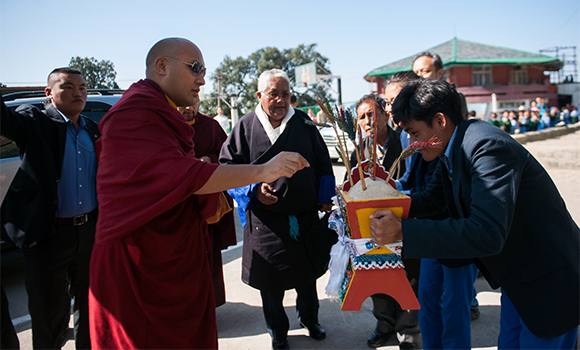
October 10, 2016 – Tibetan Children’s Village School Upper Dharamshala, India
Recently the Gyalwang Karmapa spent three days at the Tibetan Children’s Village School Upper Dharamsala to make a closer connection with the students and their teachers as well as their way of life and study. As he arrived on the morning of this first day, he was greeted by long lines of teachers and students with their khatas, and escorted to the school’s main hall by officials of the school, including Mr. Ngodup Wangdue, the Director, and Mr. Namdol Tashi, the Principal.
In this hall the first event of the Karmapa’s visit took place—the concluding program of a month-long study of logic in the Tibetan tradition. As the chief guest, the Karmapa addressed the assembly. He first cited HH the Dalai Lama’s counsel that students should focus on Buddhist logic, philosophical systems, and practice, and rejoiced praising the students’ and teachers’ enthusiastic efforts in these areas. The Karmapa noted, “Both inside and outside Tibet, there has been a recent upsurge of interest in debating through valid reasoning.”
The Karmapa then examined briefly the history of rigs lam, the Tibetan word for logic or valid reasoning. “If we look at the old texts,” he explained, “we find rigs lung btang ba, a shortened version of rigs and lung btang ba (to employ reasoning and scripture). Over time this term probably evolved into rigs lam.” He followed this with a quick look at the history of the science of logic or validity.
“It is extremely important to examine closely reasoning and scripture” the Karmapa continued, “by using logic that is based on these two, so that we can eliminate what is not understood by others and their wrong views as well as removing our own wrong views, which we may not be aware of.” He added, “And this subject matter is relevant not only in the context of Buddhism but it applies to linguistics, science, mathematics, and many other areas of inquiry.”
The Karmapa emphasized, “It is through developing the two wings of excellent living traditions and fine modern education that students can soar. This is the goal of our Tibetan Children’s Villages.”
Modern education and sustaining Tibetan traditions are key in these difficult times, he stated and so “We all have to do our utmost with great dedication.” He noted that in Tibet, even through people face great difficulties, they have huge determination and altruism, from which we all could learn. He cautioned Tibetans in India against losing their initial enthusiasm and positive thinking. These are critical and unusual times, he said, and we need to think seriously about them. He concluded by asking people not to let up and continue their efforts to follow in the path of HH the Dalai Lama’s advice.
[Best_Wordpress_Gallery id=”8″ gal_title=”Connecting with the Younger Generation of Tibetans”]


